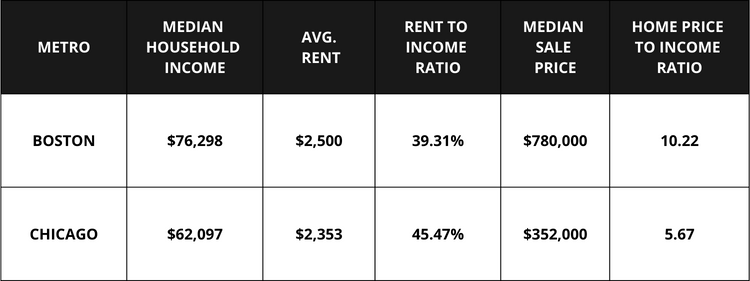
Chicago and Boston are both iconic American cities that enjoy international acclaim. Boston is a relatively small city, but with a lot of history and plenty of opportunities. It is known around the world for being the cradle of American history, home to the Boston Common, and where you’ll find hardcore football fans cheering for the Patriots. By contrast, Chicago is a much larger city; it is the third most heavily populated city in the U.S. after New York City and Los Angeles. Chicago residents can enjoy Millenium Park, a modern public park spanning 24.5 acres, and cheering for the Bears. While some football fans may be loyal enough to pick a city based on their favorite team, we recommend comparing the cost of living and salaries in each city for a more complete picture.
Is it more expensive to live in Boston or Chicago?
Yes, it is more expensive to live in Boston than in Chicago. However, that is not the whole story as wages in Chicago are about 20% lower. While the median household income in Boston was last recorded at $76,298 by the U.S. Census Bureau, in Chicago that number was $62,097. Additionally, Boston has been repeatedly voted as the top U.S. city when accounting for overall quality of life.
Consumer prices are only slightly lower in Chicago, when compared to Boston- 8.37% lower. This is a low enough percentage that it will vary greatly depending on your diet. For example, fruits like bananas and apples are between 12% and 15% more expensive in Chicago. Eggs, on the other hand, are about 11% less expensive in Chicago. A pound of beef costs the same (on average, a pound of beef costs only 1 cent more in Chicago than in Boston).
Transportation is also slightly more expensive in Chicago if you drive. Gas is cheaper in Boston, since gas taxes are almost double in Illinois when compared to Massachusetts. In Boston, gas is currently at $4.611/ gallon, and in Chicago gas is currently at $4.993/ gallon. Additionally, given that Chicago is 234 square miles and Boston proper is only 48.4 square miles, drivers in Chicago can reasonably be expected to drive longer distances. However, public transportation is more affordable in Chicago than in Boston if you have a monthly pass. A monthly MBTA pass in Boston is $90, while a 30- day CTA pass in Chicago is $75. Individual, one-way subway fares are 10 cents cheaper in Boston.

Chicago vs. Boston: Median Sales prices
The median sales price for Boston homes is higher than for homes in Chicago. The median price for home for sale in Boston for 2022 is $780,000, with a 3.6% year-over-year increase. The median sales price for a home in Chicago is $352,000, with a 0.7% increase over the previous year. Yet, relative to their own cities, local purchasing power is lower in Chicago than in Boston. This is something to consider if you’re torn between living in Boston or Chicago. Owning a home and the benefits that come with it, including building long-term wealth, is something most Americans want.
Chicago vs. Boston: Average rent prices
The average rent prices in Chicago are lower than Boston average rent prices for studio and 1- bedroom units but are higher for units larger than 2 bedrooms. Studios in Chicago are currently averaging $1,352 per month, while Boston studio apartments are currently averaging $1,882 per month. In Chicago, the year-over-year increase for studios is +6%, while in Boston the year-over-year increase for studio rents is +10.16%. 1-bedroom apartments in Chicago average $1,999 monthly rent, with a +12% year-over-year increase. This is only 8.5% lower than the average 1-bedroom rent in Boston of $2,185. The year-over-year increase for 1-bedroom apartments in Boston is +10.66%.
Units with 2 bedrooms or more paint a different picture. 2-bedroom apartments in Chicago average $2,725 per month. In Boston, 2-bedroom apartments are currently averaging $2,697, which is slightly lower than in Chicago- 1.02% lower. Boston’s year-over-year increase for 2- bedroom rents is only 8.76%, much lower than Chicago’s +13% year-over-year increase, which may be why Chicago is now more expensive for this unit type. 3-bedrooms in Chicago are currently averaging $3,339, and 3- bedroom apartments in Boston are currently averaging $3,236. The year-over-year increase for Boston and Chicago 3 bedrooms are similar- 5.96% and 6% respectively.

Chicago vs. Boston: Income to Housing Expenses Ratios
When median income is compared to the cost of living for both cities, the results are complex. The average rent in Chicago is lower than in Boston, but the rent-to-income ratio is higher. While in Boston the rent to income ratio varies from 34% – 39.31%, slightly higher than the recommended amount, in Chicago it is much higher at 45.47%. This means that, on average, Chicago residents are spending almost half of their income on rent.
On the other hand, the home price to income ratio is almost double in Boston compared to Chicago. In Boston it is 10.22, and in Chicago it is 5.67. However, it is worth noting that the higher rent-to-income ratio is likely to prevent Chicago residents from saving for a down payment and other upfront home buying costs at the same rate Boston residents can.
Conclusion
The cost-of-living comparison for Boston vs. Chicago is not as straightforward as it is with other expensive metros like New York and San Francisco. Boston is definitely more expensive than Chicago for both average rent price and median home price, but Boston residents make more money overall to compensate for that. When adjusted for household income levels, the cost of living for renting an apartment in Boston actually looks better than Chicago despite the higher rent price comparatively. However, for homeowners, it’s more complex. There’s a large disparity in median sales price, making Chicago a much more affordable city to own a home- but the high rents may prevent residents from saving for a down payment at the same rate Boston residents can.
It’s important to note that this analysis is based on averages over huge data sets, and everyone’s situation is unique. It may make sense for you economically to move to a more expensive city where the opportunity to earn a higher income would offset the higher cost of living. It’s important to weigh all these factors when deciding on a place to live. For everything related to Boston apartments, Boston real estate, and Boston multi-family, head over to BostonPads.com!

Andrew Pitsios
Published August 25, 2022




